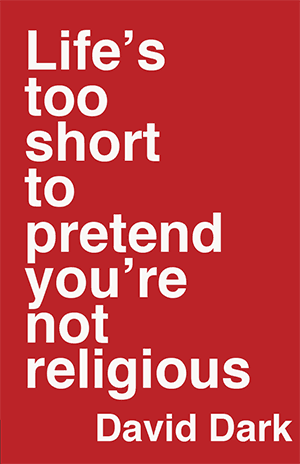 I recently asked my Facebook friends what connotations the term “religious” has for them. The answers ran the gamut, from the generally positive:
I recently asked my Facebook friends what connotations the term “religious” has for them. The answers ran the gamut, from the generally positive:
“sacred space,” “ritualistic,” “disciplined,” “a shared set of beliefs and moral standards”
to the safely neutral:
“vague,” “subscribing to a particular religion. no more, no less,” “parameters of how they view life.”
to the negative:
“intolerant,” “wrapped up in the letter of the law,” “makes me cautious,” “ick” “conjure[s] up derision,” “suspicion”
and even the outright hostile, in the form of a hastily retracted comment of “deluded” and “mean.”
It’s toward those on the negative end of the spectrum that David Dark’s new book, Life’s Too Short to Pretend You’re Not Religious (InterVarsity Press, $20), is addressed. Dark argues that the term “religious” has become an unnecessary source of exclusion and judgment, a pejorative used to marginalize and suppress those with whom we disagree.
Dark makes an end run around the negative connotations, neatly avoiding both the knotty metaphysical issues behind religious belief as well as the pragmatic realities of thousands of years of human religious practice. Instead, he proposes radically redefining the entire notion of religion, characterizing it as simply the “controlling story” of our lives (14).
Given that definition, we are all, whether we admit it or not, deeply religious. We all have a narrative that we live by, we all have commitments and priorities and values that shape who we are. Since, practically speaking, we are all religious, Dark believes that we should embrace the term, claiming it anew as a source of empowerment and enlightenment:
“If what we believe is what we see is what we do is who we are, there’s no getting away from religion. We all want to know who we are, where and how we fit in, and what our lives might yet mean. And in this sense, religion might be the best word we have for seeing, naming, confessing and really waking up to what we’re after in all we do, of becoming aware of what’s going on in our minds.” (16)
Drawing upon personal anecdotes and a cornucopia of literary and cultural references, Dark traverses the ins and outs of human religious existence — which, for him, is really just human existence itself. He views religion not as a narrow set of doctrinal commitments, but as a source of unity and an opportunity to explore our shared humanity.
If religion truly is “the what, the to whom, and the how of our everyday lives” (115) then it’s incumbent upon us to make the most of that religion. Dark sums up this responsibility:
“If my religion is my relationship to the world, good religion would be the work of developing, growing and keeping consciousness, not closed, shut, settled, rigid or done for, but one of ever-unfolding receptivity and, if you like, continual repentance, a continual turning away from all of my not-quite-worthy-of-life commitments, a way of taking responsibility for what I do. In this sense, it seems to me that owning this relationship as religion is a requirement of good faith and therefore a step in the direction of true religion.” (131)
I’m sympathetic to Dark’s reimagining our use of the term “religious,” but I also think that it’s naive, and perhaps dangerous, to downplay the real and significant reasons why so many people hold such a dim view of religion. Religion has been complicit in some of the greatest atrocities in our history and it still frequently acts as a virulent source of hate and intolerance.
In this book, Dark chooses to focus on the positive promise that renewed relationships and awareness can bring. It’s good to be optimistic, but until we really wrestle with the seedy underbelly of religion, until we stamp out the abuse, violence, and oppression that still occur every day in the name of religion, then Dark’s proposal to embrace the term “religious” seems a bit empty. Does merely reappropriating a term, even if accompanied by the best of intentions, truly offer enough hope for humanity’s embattled relationship with religion?
Throughout the book, Dark asks us view ourselves honestly, to truly examine who we are and how we interact with one another. Whether or not we label this process “religious,” it’s still a noble and worthwhile task:
“…understanding ourselves to be just as religious as any and everyone else might afford us time, space and vision with which to see ourselves more clearly and honestly, the better to grasp or begin to grasp—it’s a life’s work after all—the deepest implications of what we’re doing to ourselves and others.” (189)
Though I remain unconvinced that “religious” is a term worth trying to save, I do completely agree with Dark that life is indeed short, and it’s certainly too short to pretend we’re anything we’re not.
Find out more about Life’s Too Short to Pretend You’re Not Religious at the Patheos Book Club.
 Dan Wilkinson
Dan Wilkinson
Dan is the Executive Editor of the Unfundamentalist Christians blog. He is a writer, graphic designer and IT specialist. He lives in Montana, is married and has two cats.
Leave a Reply